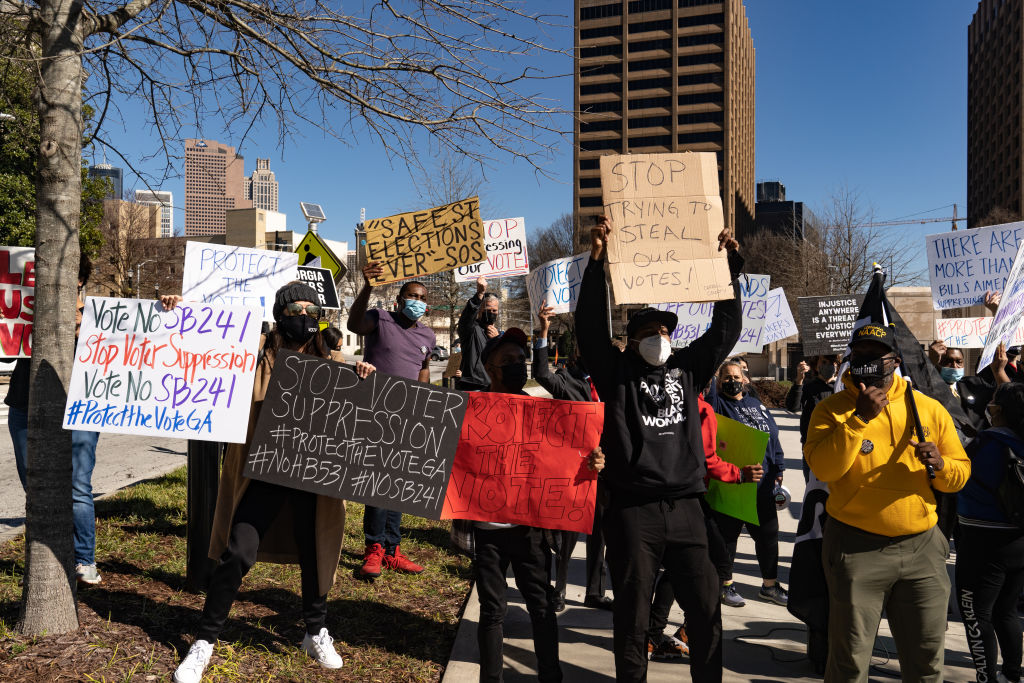Analysis: Georgia Anti-Voter Law Dramatically Increased Absentee Ballot Rejections In 2021 Municipal Elections
Source: Megan Varner / Getty
A Mother Jones analysis published Friday revealed that Georgia residents experienced a dramatic increase in mail-in ballot rejections during last year’s municipal elections—a development the report’s authors say is attributable to the state’s recently enacted Republican-led voter suppression law.
According to reporters Ryan Little and Ari Berman:
During municipal elections in November, Georgia voters were 45 times more likely to have their mail ballot applications rejected—and ultimately not vote as a result—than in 2020. If that same rejection rate were extrapolated to the 2020 race, more than 38,000 votes would not have been cast in a presidential contest decided by just over 11,000 votes.
In November 2021, Georgians who successfully obtained mail ballots were also twice as likely to have those ballots rejected once they were submitted compared to the previous year. If that were the case in 2020, about 31,000 fewer votes would have been cast in the presidential election.
Election law attorney Marc E. Elias—who along with colleagues won 64 of the 65 lawsuits challenging President Joe Biden’s 2020 victory—reacted to the Mother Jones report by tweeting: “This is why we are fighting this new law in court. Democracy is on the docket.”
This is why we are fighting this new law in court. Democracy is on the docket.
“If that same rejection rate were extrapolated to the 2020 race, more than 38,000 votes would not have been cast in a presidential contest decided by just over 11,000 votes.”https://t.co/KOxtjiYxoa
— Marc E. Elias (@marceelias) January 28, 2022
Elias was referring to S.B. 202, which was signed into law by Georgia Gov. Brian Kemp, a Republican, last March. As Common Dreams reported at the time, the legislation imposed strict voter identification requirements, significantly limited the use of absentee ballot drop boxes, eliminated mobile voting vans, and made it a crime to give water to people waiting in line to vote.
Little and Berman assert that the disenfranchisement that occurred in last year’s Georgia municipal elections “was a direct result of measures to limit mail voting passed by the GOP Legislature.”
“More than half of mail ballot applications were rejected because they arrived after the state’s newly imposed deadline to request them,” they write. “In 2020, Georgia voters could request a mail ballot up until the Friday before Election Day; under the new law signed by Gov. Brian Kemp in March 2021, voters must place their requests no later than 11 days before the election, which voting rights advocates say is too early and burdensome for many voters.”
In 2020, more than 21,000 Georgians—including Kemp, who requested his ballot on Election Day—cast their ballots within 11 days of the November 3 contest, something that is no longer possible due to the new law. Kemp also dropped off his ballot on Election Day, which is now prohibited, as the law he signed cuts off dropbox access four days before the election.
The reporters write:
These rejections are having a disproportionate impact on Democratic-leaning constituencies. Black voters, who make up about a third of the electorate in Georgia, accounted for half of all late ballot application rejections, according to the voting rights group Fair Fight Action. Voters 18 to 29 made up just 2.76% of mail voters in 2021, but they constituted 15% of late ballot application rejections.
“Overall, four times as many Democratic voters requested mail ballots compared to Republicans,” they say, “so an increase in rejections will particularly harm their party.”
The new analysis belies claims by Republicans and right-wing Democratic Sen. Joe Manchin (W.Va.) that states are not engaged in voter suppression, and the report’s authors suggest the data could portend widespread voter disenfranchisement resulting from GOP-led legislation in the 2022 midterm and 2024 general elections.
Less than two weeks ago, Joe Manchin remarked, “We act like we’re going to obstruct people from voting. That’s not going to happen.”
Hello? Black voters accounted for half of all ballot application rejections in Georgia. People of color are being disenfranchised as we speak. https://t.co/WtH1z5ZFCR
— Robert Reich (@RBReich) January 28, 2022
“The truly troubling aspect of these numbers is that municipal voters tend to be much more experienced voters, ‘super-voters,’ if you will, who are less likely to make these sorts of errors,” like returning their ballots late, Sara Tindall Ghazal, a Democratic member of the Georgia State Election Board, told Mother Jones.
“Extrapolating that to a much higher turnout election expected this year suggests that absent a massive voter education effort, many more eligible voters will be disenfranchised by these onerous restrictions—which seems to me to have been the point,” she added.
Little and Berman note that Georgia isn’t the only state where voters are experiencing difficulty casting ballots due to restrictions enacted by Republican-controlled state legislatures. In one example reported by Common Dreams earlier this month, a number of Texas counties are experiencing an alarming number of mail ballots being rejected in the wake of S.B. 1, a law signed by Republican Gov. Greg Abbott last September. In Travis County—home to Austin, the state capital—around half of all mail-in ballot applications have been rejected.
According to the Brennan Center for Justice, 19 states passed 34 laws last year making it harder to vote.
Advocates warn of a “tidal wave” of GOP voter suppression heading into the 2022 midterm elections, with restrictive laws—coupled with former President Donald Trump’s “Big Lie” that the 2020 presidential election was stolen—posing a “serious threat” to U.S. democracy, according to the Brennan Center.
Brett Wilkins is a staff writer for Common Dreams.
This article is republished from Common Dreams under Creative Commons (CC BY-NC-ND 3.0). Read the original article.
SEE ALSO:
Where The Party At? Black Voters Are All Dressed Up With Nowhere To Go
[ione_media_gallery id=”4277202″ overlay=”true”]

